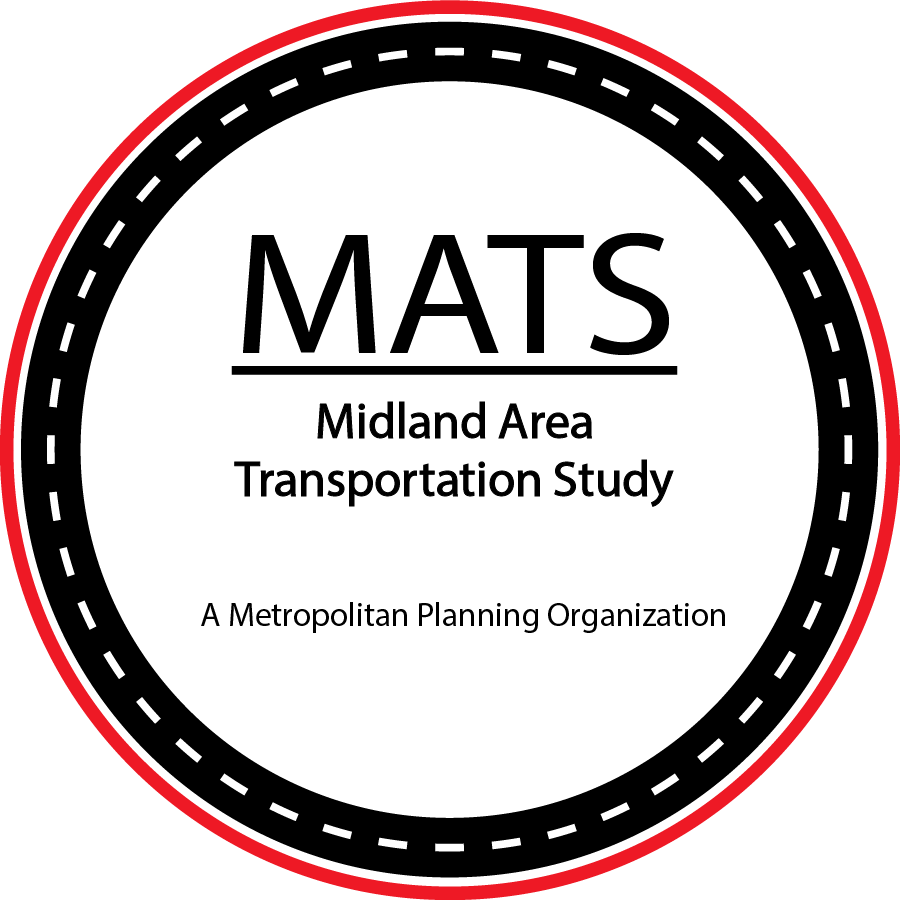Transportation Improvement Program (TIP)
What is the TIP?
The TIP is a federally required, four-year plan that outlines all transportation projects scheduled for federal funding and construction within the MATS area. It ensures that projects are fiscally constrained, and that they support the region’s long-term transportation goals.
The TIP is a key part of the transportation planning process. It serves as one of the main tools used to put the region’s long-range transportation plan, Towards 2045, into action.
The TIP is essentially a roadmap for how federal transportation funds are spent in the Midland area. Developed and adopted by the Metropolitan Planning Organization (MPO), it lists prioritized projects for interstate, major roads, and transit that includes work like road and bridge improvements, transit enhancements, trail and railway upgrades, and safety initiatives. Only projects listed in the TIP are eligible for federal funding through the Federal Highway Administration (FHWA) and Federal Transit Administration (FTA). The TIP can also fund early planning work, including feasibility studies, design, and environmental reviews to help prepare future transportation projects.
Fiscal Years 2026-2029 TIP Report
The following document represents the TIP for MATS for Fiscal Years 2026 – 2029 (October 1, 2025 through September 30, 2029). This report was prepared by the staff of the Midland Area Transportation Study (MATS), which is solely responsible for its content. It was approved by the Policy and Technical Committees on June 3, 2025 following a public hearing.
-
Local planners and engineers often start the process by identifying potential transportation improvements based on community needs, technical analyses, previous studies, and citizen input.
These local project ideas are then reviewed at the city, county, and regional levels, in coordination with the Michigan Department of Transportation (MDOT). Once each agency develops its list of projects and priorities, it submits them to MATS.
To select which projects are included in the TIP, MATS uses a consistent set of evaluation criteria. These include factors such as safety, pavement condition, economic impact, congestion relief, traffic volume, non-motorized transportation (NMT) opportunities, and local funding support to develop a proposed project list.
The MATS Technical Committee reviews the proposed list and makes recommendations to the Policy Committee, which ensures that the region’s highest priorities are addressed within available funding. After reviewing Technical Committee recommendations and considering public input, the Policy Committee finalizes and adopts the multi-year TIP.
-
The public comment period for the MATS FY 2026–2029 TIP ran from April 14, 2025, to May 18, 2025. During this time, community members had multiple opportunities to review and provide feedback on the draft TIP report and proposed list of transportation projects.
Two public open houses were held to gather input in person: on April 17, 2025, at the Loon’s game at Dow Diamond and on May 7, 2025, at the Midland Farmer’s Market. Many community members attended and engaged with MATS staff at these events; however, no formal public comments were submitted during the comment period. The draft report and proposed project list were also made available online, with a form provided for public feedback.
These engagement efforts ensured the community had ample opportunity to review and discuss the proposed TIP projects, even though no formal comments were received.
Report preparation was financed in part through grants from the FHWA and FTA of the U.S. Department of Transportation (USDOT) under the Metropolitan Planning Program, Section 104(f) of Title 23, U.S. Code. The contents of this report do not necessarily reflect the official views or policies of the USDOT. Additional financing was provided by the City of Midland and Midland County Road Commission
MAKING CHANGES TO THE TIP
During the lifespan of a TIP, updates to the project list may be necessary to reflect changes such as adding a new project or phase, modifying an existing project (for example, adjusting project limits, project descriptions, funding amounts, or funding type), or removing a project entirely. These changes can be due to new funding opportunities or unforeseen circumstances.
-
As the schedule below shows, this organizes the process of proposed changes to the TIP so that information can be gathered, reviewed, and presented in a timely fashion, prior to a decision by the Policy Committee.
When a change is proposed, MATS staff, working closely with the Michigan Department of Transportation (MDOT) to review and prepare a draft table summarizing the proposed amendments. This draft is shared with the public and presented to both the Technical and Policy Committees. If the MATS Policy Committee approves the changes, they are often grouped with other recent amendments and sent to MDOT before final approval by the FHWA and FTA.
-
Click the picture to see the full table
This information shows the latest proposed changes to the MATS 2026 - 2029 TIP, to be presented to the Policy Committee at their next meeting, in addition to any proposed GPA changes. You can comment on these proposed changes by clicking here!
While the main TIP report generally remains unchanged, the official listing of approved projects may be updated and reissued once the amendments receive all required approvals.

